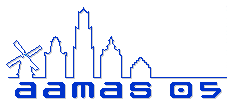
OWL-P: OWL for Protocol and Processes
Ashok U. Mallya, Nirmit Desai, Amit K. Chopra, Munidar P. Singh
OWL-P is a commitment-based protocol enactment framework that uses the
Web Ontology Language (OWL) to characterize protocols and processes. OWL-P
represents protocols as rule-based transition systems that give first-class
status to the commitments of the participants. This representation maximizes
the flexibility of the agents enacting a given protocol and enables them
to best handle semantic exceptions that may arise during enactment. Protocols
can be composed to yield more protocols, and can be instantiated with
agent policies to yield business process specifications. OWL-P provides
support for designing agents and enacting business processes that are
specified using protocols and policies. The advantages of OWL-P for interactions
among autonomous entities such as businesses are as follows:
- The specification and enactment of flexible protocols. Protocols in OWL-P are based on commitments among autonomous agents, which gives them a goal-based flavor and enables them to intelligently handle semantic exceptions.
- A formal model for protocols which enables protocols to be modularly composed from existing ones. OWL-P is based on the theory of commitment protocols and contains a protocol algebra that allows designers compose hybrid protocols from existing ones to suit different deployment contexts.
- A clear separation of public behavior of participants of a protocol from their private policies. OWL-P also has a methodology for developing protocol-based processes for interactions between independent participants wherein a process is viewed as the amalgam of the public interaction protocols of these participants and their private policies (such as business policies).
The OWL-P framework consists of the following:
- An Ontology for process and protocol concepts in OWL. The ontology specifies rules using the Semantic Web Rule Language (SWRL).
- A plugin for the Protege Ontology Editor to edit OWL-P protocols and OWL-P composition profiles that specify, using composition axioms, how protocols are composed using.
- A composer tool written in JAVA that generates an OWL-P protocol specification given a composition profile.
- A rule transformation module that translates OWL-P (SWRL) rules into the CLIPS format, for used by the Java Expert Systems Shell (JESS).
- A protocol enactment framework implemented using the J2EE, that uses a messaging system to facilitate communication between protocol participants, JESS as a rule engine to enact the rule-based protocol specification by combining them with the participants' local policies.
This project reflects conceptual and theoretical work that we have been carrying on for several years.